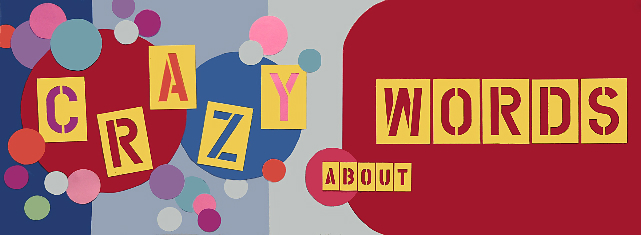June bugs and other cute things
Joe Mc Kay’s “Crazy About Words”
…toasting our language since 2003!
Today, we toast June Bugs, the genus phyllophaga, (from two Greek words, phaga–eating + phyllo--leaves), not because of their propensity to eat everything in your garden this month, but because their name, as it rolls off the tongue, has delighted the ears and piqued the imaginations of so many language-loving humans. “June bugs,” or “Junebugs,” has lent its cute name to song and movie titles, fictional characters, a tropical cocktail made with rum and melon liqueur, a 1908 Curtis-design aircraft, and to Dale Earnhardt, Jr. of NASCAR fame as a nickname.
A quintessential American expression, “gung-ho,” originated as two Chinese characters meaning "work together," and was the name of a Chinese workers’ co-operative. The sound and its meaning was picked up by a US Marine Major in the Pacific in 1943. Anxious to boost the team spirit of his men, he adopted the term, gung-ho, which swept quickly through the Marine Corps. It was used as the title of a movie starring Randolph Scott and Robert Mitchum later the same year. After the war, its usage broadened in American culture to mean "highly enthusiastic" or "dedicated."
Speaking of Americanisms, former Poet Laureate, Billy Collins, wrote a wonderful, funny poem titled “Le Chien” in which a tipsy narrator engages a dog in a one-way conversation late at night on a street in Paris. The narrator attempts to explain a list of phrases including “corn dog,” “white walls,” “tag sale,” “helmet laws,” and “the March of Dimes,” as the dog stares with “dark-brown, adoring eyes.” The last on this list made me howl… I suppose because it is generically different from the others in the list and came as a surprise. It was originally called the “National Foundation for Infantile Paralysis” by its founder, President Franklin D. Roosevelt. The much catchier “March of Dimes” came later, thanks to vaudeville star Eddie Cantor, who hosted a 1938 benefit he named as a take on the popular contemporary newsreel series, “The March of Time.”
A recent “Google a Day” quiz asked, “How many times larger is a million than a myriad?” I had only known this word as meaning a very large but indefinite number, but learned that it was the ancient Greek equivalent of 10,000, their largest number. (Today, our largest named number is ‘googol’ … a 1 followed by one hundred zeros. Ironically, “Google” was named by its founders in a misspelling of “googol” intended to signify that the company wanted to provide huge quantities of information to its myriad customers.)
I saw the word myriad again the same day in this bit of wry humor from Jennifer Egan’s new sci-fi short story, “Black Box,” released last month by The New Yorker as serial tweets. Each sentence is a “mental dispatch” from a high-tech female spy operating in the Mediterranean: “If you wish to avoid physical intimacy, (with her abductor, as he hurries her to the waterfront) the sight of a speedboat will bring relief, despite the myriad new problems it presents.” I loved the story, as I did her 2011 Pulitzer Prize winning novel, A Visit From the Goon Squad.
Had I seen the word shambolic standing alone, I might have guessed it to be associated with an Eastern philosophy, akin to ‘shamanic’ perhaps. But, in the context of Thomas Beller’s sentence in a recent NYT article about his being a writer who divides his time between NYC and New Orleans, it defined itself. “…I came up with a theory that New Orleans was like the New York of the 1970s…ungentrified, shambolic, chaotic in ways bad and good, cheap, terrifying, a place hospitable to whimsy.” Its first recorded use was in 1970, and it is still regarded as British slang meaning chaotic or disorganized, a glorious mess. I don’t know why it is taking so long to have it acknowledged as a proper adjective derived from shambles; there is no other.
Your bonus “June bug:” quagmire…is 2 words put together, each meaning the same thing…a marsh or a bog…a redundancy within itself! I can’t wait to use its adjective, quaggy, the next time I step onto my over-watered lawn.
Joe Mc Kay,
June 2012
Comments, suggestions & questions welcome at crazyaboutwords@gmail.com






